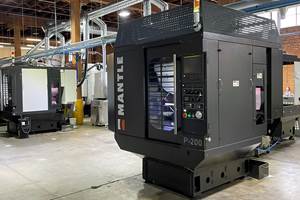How to Sell Your Business to Your Key Employee
With an Intentionally Defective Trust (IDT), owners can sell their businesses tax-free while protecting their buyers.
Share



Hwacheon Machinery America, Inc.
Featured Content
View More
Takumi USA
Featured Content
View More
ECi Software Solutions, Inc.
Featured Content
View More




.png;maxWidth=45)
DMG MORI - Cincinnati
Featured Content
View MoreThe trust is not recognized for income tax purposes. The result under the Internal Revenue Code is that every penny the seller receives is tax-free—no capital gains tax on the note payments and no income tax on the interest income.
• The trustee of the IDT can be instructed to keep possession of the non-voting and the voting stock (if in the trust). This way, if your beneficiary child gets divorced, his/her spouse will have no interest in the stock.
Related Content
In Moldmaking, Mantle Process Addresses Lead Time and Talent Pool
A new process delivered through what looks like a standard machining center promises to streamline machining of injection mold cores and cavities and even answer the declining availability of toolmakers.
Read MoreBuilding Machines and Apprenticeships In-House: 5-Axis Live
Universal machines were the main draw of Grob’s 5-Axis Live — though the company’s apprenticeship and support proved equally impressive.
Read MoreFinding the Right Tools for a Turning Shop
Xcelicut is a startup shop that has grown thanks to the right machines, cutting tools, grants and other resources.
Read MoreHow I Made It: Amy Skrzypczak, CNC Machinist, Westminster Tool
At just 28 years old, Amy Skrzypczak is already logging her ninth year as a CNC machinist. While during high school Skrzypczak may not have guessed that she’d soon be running an electrical discharge machining (EDM) department, after attending her local community college she found a home among the “misfits” at Westminster Tool. Today, she oversees the company’s wire EDM operations and feels grateful to have avoided more well-worn career paths.
Read MoreRead Next
5 Rules of Thumb for Buying CNC Machine Tools
Use these tips to carefully plan your machine tool purchases and to avoid regretting your decision later.
Read MoreBuilding Out a Foundation for Student Machinists
Autodesk and Haas have teamed up to produce an introductory course for students that covers the basics of CAD, CAM and CNC while providing them with a portfolio part.
Read MoreRegistration Now Open for the Precision Machining Technology Show (PMTS) 2025
The precision machining industry’s premier event returns to Cleveland, OH, April 1-3.
Read More










































